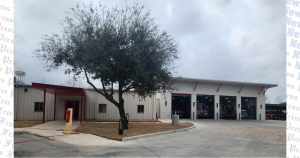[dropcap]W[/dropcap]hen Buda fire chief Clay Huckabywas eating lunch in Kyle recently, he heard the call about a child being locked in a car accidentally nearby. Responding within seven minutes along with Kyle officials, a disaster was averted.
But the reality is that the situation could have easily gone the other way.
Record-setting heat waves across Texas have once again raised concerns about the safety of children and pets when exposed to the sweltering heat in locked cars.
Kyle Chief of Police Jeff Barnett and Buda Fire Chief Clay Huckaby urge residents to be vigilant when traveling with their pets and kids this summer and to try to employ reminder techniques – like leaving a shoe or a handbag in the backseat – so that parents will look into the back of the vehicle before jumping out at work or while running errands.
Huckaby said most children who die in hot cars get locked in on accident when playing, so he advises caregivers to “have a hide-away key” stashed nearby in order to get in during an emergency.
Huckaby said residents who witness a child or animal in a hot car should immediately call 9-1-1 for assistance.
“Immediately dial 9-1-1 and if the child is distressed, do everything to get the child out,” Huckaby said. Huckaby described a similar situation at the Target in Kyle where a mom accidently locked her keys and her child in the car; Huckaby and others responded quickly and were able to get the child out of the automobile.
According to the National Highway Traffic Safety Administration (NHTSA), 700 children have died due to vehicular heatstroke from 1998 to 2016, an average of 38 children dying per year.
Depending on the outdoor temperature, the temperature inside of a car can rise more than 20 degrees in 10 minutes. Even at an outside temperature of 60 degrees, the inside of the car can reach more than 100 degrees. The NHTSA noted that parking in the shade and cracking the windows won’t help enough to prevent death over an extended period.
A child dies when his/her body temperature reaches 107 degrees.
So far this year, there have been six child heatstroke deaths in Texas.
The NHTSA calculated that approximately 30% of child heatstroke deaths have occurred when a child has gotten into a car without the caregiver knowing; only 20% of child heat stroke deaths occurred as a result of intentional negligence.
“It’s a very serious matter,” Barnett said. “We investigate, press charges and notify Child Protective Services if necessary.”
“We want people to err on the side of saving a child or animal,” Barnett said, “but be prepared to account for their actions with law enforcement.”








